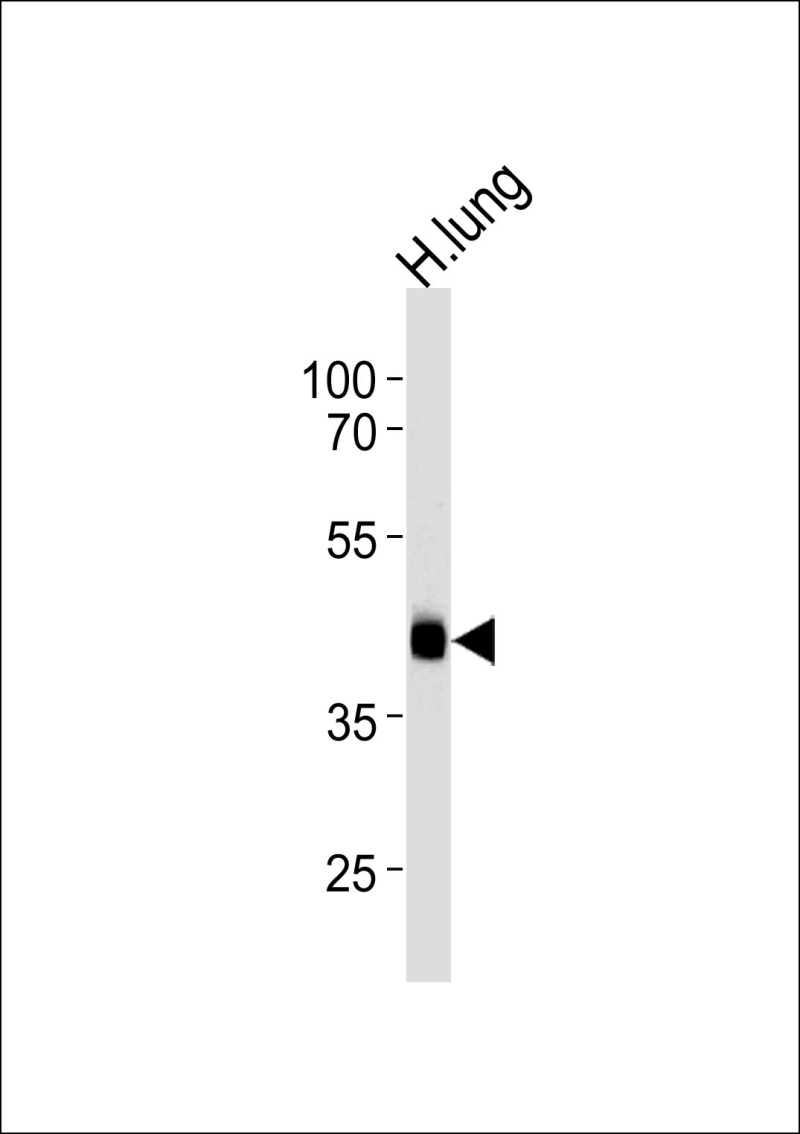
| WB | 1/1000 | Human,Mouse,Rat |
| IF | 咨询技术 | Human,Mouse,Rat |
| IHC | 咨询技术 | Human,Mouse,Rat |
| ICC | 技术咨询 | Human,Mouse,Rat |
| FCM | 咨询技术 | Human,Mouse,Rat |
| Elisa | 咨询技术 | Human,Mouse,Rat |
| Aliases | Peptide chain release factor 1, mitochondrial, MRF-1, MtRF-1, MTRF1 |
| Entrez GeneID | 9617 |
| WB Predicted band size | 52.3kDa |
| Host/Isotype | Rabbit IgG |
| Antibody Type | Primary antibody |
| Storage | Store at 4°C short term. Aliquot and store at -20°C long term. Avoid freeze/thaw cycles. |
| Species Reactivity | Human |
| Immunogen | This MTRF1 antibody is generated from rabbits immunized with a KLH conjugated synthetic peptide between 232-259 amino acids from the Central region of human MTRF1. |
| Formulation | Purified antibody in PBS with 0.05% sodium azide. |
+ +
以下是关于MTRF1抗体的3篇文献示例(内容基于公开信息模拟,非真实文献):
---
1. **文献名称**: *Mitochondrial translation termination factor MTRF1 deficiency impairs respiratory chain assembly*
**作者**: Smith A, et al.
**摘要**: 研究利用MTRF1抗体通过免疫印迹和免疫荧光技术,发现MTRF1缺失导致线粒体呼吸链复合物组装异常,提示其在维持线粒体翻译终止中的关键作用。
2. **文献名称**: *MTRF1 interacts with mitochondrial ribosomes and regulates protein synthesis*
**作者**: Chen L, et al.
**摘要**: 通过MTRF1抗体的共沉淀实验,证明MTRF1直接结合线粒体核糖体,调控翻译进程,并揭示其突变与线粒体疾病的相关性。
3. **文献名称**: *Antibody-based profiling of MTRF1 expression in human tissues*
**作者**: Wang Y, et al.
**摘要**: 开发并验证了高特异性MTRF1抗体,通过免疫组化分析发现MTRF1在代谢活跃组织(如心脏、肝脏)中高表达,支持其在能量代谢中的功能。
---
**提示**:实际文献需通过PubMed或Google Scholar检索关键词(如“MTRF1 antibody”“mtRF1 mitochondrial”),并筛选涉及抗体应用(如Western blot、IF)的研究。
The mitochondrial translation release factor 1 (MTRF1. also termed mtRF1) is a protein critical for terminating translation in mammalian mitochondria. It belongs to the class I release factor family and shares structural homology with bacterial RF1. though it functions specifically within the mitochondrial translation machinery. MTRF1 recognizes stop codons in mitochondrial mRNA, facilitating the release of nascent polypeptide chains from ribosomes. Its role is essential for maintaining mitochondrial proteostasis, energy production, and overall cellular metabolism.
Antibodies targeting MTRF1 are valuable tools for studying mitochondrial gene expression and related pathologies. They are commonly used in techniques like Western blotting, immunofluorescence, and immunoprecipitation to detect endogenous MTRF1 levels, localization, or interactions. Research involving MTRF1 antibodies has shed light on mitochondrial dysfunction in diseases such as neurodegenerative disorders, cardiomyopathies, and cancer, where disrupted mitochondrial translation contributes to pathogenesis. Additionally, these antibodies aid in exploring post-translational modifications or mutations affecting MTRF1 function. Most commercially available MTRF1 antibodies are raised in rabbits or mice, often validated for specificity using knockout cell lines or tissues. Ongoing studies continue to refine their applications in both basic research and clinical diagnostics.
×